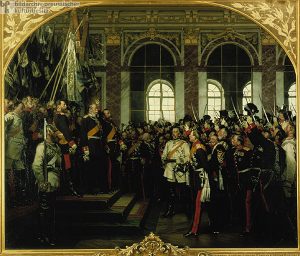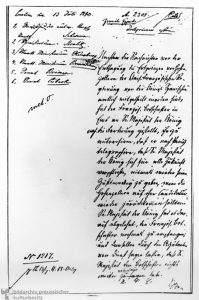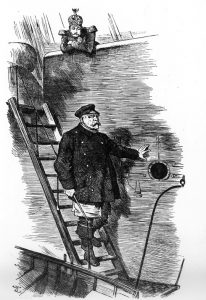
This war represents the German revolution, a greater political event than the French revolution of last century. . . . Not a single principle in the management of our foreign affairs, accepted by all statesmen for guidance up to six months ago, any longer exists. . . . The balance of power has been entirely destroyed, and the country which suffers most, and feels the effects of this great change most, is England. (Hansard, 9 February 1871)[1]
These are the words of Benjamin Disraeli, one of Britain’s greatest statesmen, spoken a few weeks after the proclamation of the German Empire in the Hall of Mirrors at Versailles on 18 January 1871.
That empire had been built by Otto von Bismarck, Minister-President of Prussia, between 1862 and 1871 through a series of 3 wars – against Denmark, Austria and France – and his own diplomatic skills: outwitting, outmanoeuvring and sometimes simply deceiving his opponents. The way in which Bismarck doctored and then published the famous ‘Ems telegram’ to make it look as though Emperor Napoleon III of France had deliberately insulted King Wilhelm I of Prussia – simultaneously outraging both German and French opinion and leading directly to war between the 2 countries – has a very modern look in the era of fake news.


For centuries, Germany had been a power vacuum: a space composed of many states, always subject to internal rivalries and external interference. The new German Empire was a solid presence in the middle of Europe with a large and growing population – 41 million in 1871, rising to over 65 million by 1911 – and already continental Europe’s leading industrial power. This was one way in which it was soon to rival Great Britain, still the world’s leading economy.
But the new Germany posed no direct threat to Britain: its armies, victorious against continental enemies, could not reach the British Isles because it had no navy of any size; nor could they threaten Britain’s overseas empire. And rivalry with Britain had no place in Bismarck’s plans. In 1873 he told the British Ambassador:
He neither desired Colonies or Fleets for Germany. – Colonies in his opinion would only be a cause of weakness, because Colonies could only be defended by powerful Fleets, – and Germany’s geographical position did not necessitate her development into a first class Maritime Power.[1]
Yet the German Empire posed a different kind of threat – the one Disraeli had identified – to the European balance of power. Quite apart from its conquering armies, Germany’s population and industrial strength made it a destabilising force. Merely by its existence, Germany was too big for comfort. In any balance of power system, the response of countries under threat is to combine forces. Bismarck understood this better than anyone, and he devoted the rest of his political career to preventing that from happening.
The biggest danger was a combination of France and Russia. Bismarck staved this off first through the Three Emperors’ League with Austria and Russia (1873), then, when that collapsed, through the Reinsurance Treaty with Russia alone (1887). But when Kaiser Wilhelm II dismissed Bismarck in 1890, his system unravelled. By 1894 France and Russia had concluded a full political and military alliance. Continental Europe was now divided between two armed camps: the Triple Alliance (Germany, Austria and Italy) and the Dual Alliance (France and Russia).

For a time, Great Britain was able to stand aloof. However, Imperial Germany’s construction of an ocean-going fleet (from 1897) and an increasingly unpredictable foreign policy forced Britain to take sides. With the conclusion of ententes with France (1904) and Russia (1907), a Triple Entente now faced the Triple Alliance. Both sides soon became entangled in the Balkan conflicts that eventually precipitated the outbreak of the First World War in 1914.
Disraeli had been proved right: the balance of power had been entirely destroyed, and Britain would never again be able to act as the arbiter of European affairs.
[1] Private letter from Lord Odo Russell to Foreign Secretary Lord Granville, 11 February 1873 (http://ghdi.ghi-dc.org/sub_document.cfm?document_id=1853).
[1] Fuller quotation in http://ghdi.ghi-dc.org/sub_document.cfm?document_id=1849.